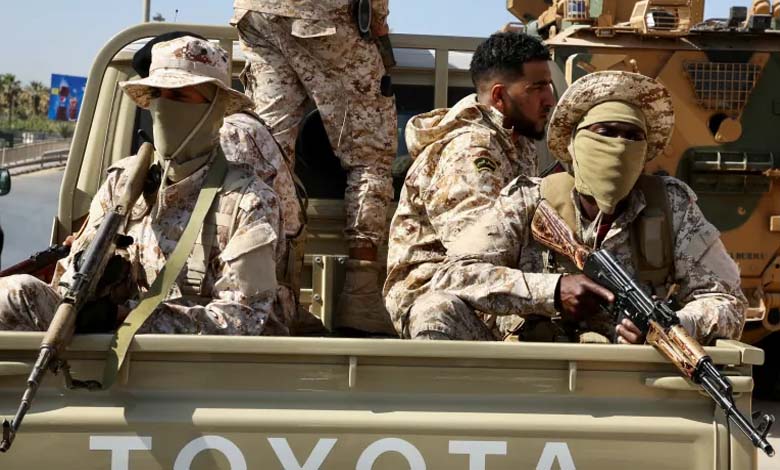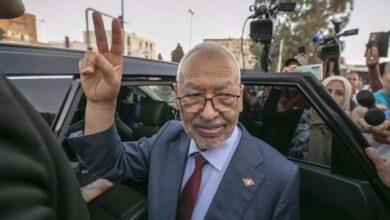Where is Western Libya Heading? Open Scenarios for the Future of the Conflict

Amid fractures shaking the power structure and growing public discontent, Tripoli today emerges as a focal point of tension and transformation in Western Libya.
These developments open the door to various possible scenarios for the future of conflict in this politically and militarily entangled region.
-
Political Stalemate Brings Militias in Western Libya Back into the Spotlight
-
Western Libya Ablaze: Bloody Clashes Turn Streets into Warzones
Experts agree that “Tripoli stands at a decisive crossroads, between a chance for political change led by the public and the possibility of widespread security collapse due to escalating militia conflicts, amid a crumbling state structure, eroded legitimacy, and loss of control.”
They stress that “the unfolding situation is not only about street protests or armed clashes, but must be seen in the context of political failure, the erosion of legitimacy, and the fragmentation of the militia alliances that have dominated the capital since 2011.”
Western Libya — especially Tripoli — appears to be reshaping under the weight of social anger, power struggles, and regional shifts reflecting broader changes in the Libyan conflict.
-
Tension rises in Western Libya after assassination of one of the biggest human traffickers
-
A new wave of tension between eastern and western Libya threatens to undermine the political process
A Pivotal Moment
Libyan political analyst Mohamed Amtairid said that “Tripoli is experiencing a pivotal moment defined by a loss of legitimacy.” He noted that Abdelhamid Dbeibah’s government is no longer able to contain popular outrage and is now directly involved in suppressing it, becoming a direct adversary in the eyes of many Libyans.
According to him, what’s unfolding in Tripoli resembles scenes from other countries that witnessed popular revolutions, where regimes fell after resorting to violence against civilians. He said: “People took to the streets, and the anger turned from scattered outbursts into a wide-scale political and social protest movement.”
He pointed out that protests at symbolic sites like Martyrs’ Square and around the Red Castle (Sarraya Al-Hamra) were not spontaneous acts but a direct response to the government losing the support of major militias, some of which either withdrew or became embroiled in internal clashes due to mutual betrayals among former allies.
What distinguishes this moment, he said, is a shift in public sentiment, with growing demands from the population to dismantle militias and end the long-standing status quo. Many are now calling for a national army and police force to restore order and bring Tripoli back under state control.
He added: “Even if ceasefires are announced or dialogue committees formed, the situation is no longer under the government’s control. The streets now shape its course. In neighborhoods like Abu Salim, Souq Al-Jumaa, and Ain Zara, the message is clear: No more militia rule.”
-
Weapon Chaos in Libya: Zawiya under the Grip of the Al-Farr and Al-Qasab Conflict
-
Libya Thwarts a Major Terrorist Plot near the Tunisian Border
Security Conflict Deepens – The State Disintegrates
Dr. Youssef Al-Farsi, a professor of political science, believes that what’s happening in Tripoli now has gone beyond mere protests into a multi-layered conflict, driven by score-settling among rival factions repositioning themselves in a failing system.
He explained: “The conflict is no longer just political. It’s an armed struggle between groups that no longer trust each other, with each trying to secure its position by force. The collapse of Dbeibah’s government could be a gateway to change, but it could also trigger a larger explosion if not managed quickly.”
-
Libya’s Muslim Brotherhood Incites Armed Resistance Against Peaceful Solutions
-
Transfer of Armed Elements from Syria to Libya… A New Muslim Brotherhood Plan
He warned that forming a new government won’t be enough unless accompanied by dismantling the entrenched networks of armed power, stressing that the militias controlling Tripoli won’t easily accept alternatives that threaten their interests, and will use any means to reignite clashes and create chaos.
He noted that the capital is currently witnessing a total breakdown of the state, pointing to the release of extremist elements, rising crime rates, and the absence of security and basic services — reflecting complete collapse.
concluded: “Libya needs a true national rescue plan — one rooted domestically and backed by sincere international support, free from conflicting interests. Ignoring the roots of the crisis will only widen the circle of violence and turn western Libya into a long-term battlefield.”
-
Militia Power: The Kidnapping of an Intelligence Officer Denies Europe Access to Libyan Gas
-
Libya Caught in the Crossfire of Great Power Rivalries… What Are the Possible Scenarios?
Toward Inevitable Collapse?
Journalist and political analyst Ayoub Al-Awjali offers an even darker outlook, saying Tripoli has passed the stage of protests and entered a phase of fundamental shift in public mood, now trapped in a state of uncertainty, with scenarios open to all possibilities.
He said: “The assassination of Abdelghani Al-Kikli, known as ‘Ghneiwa’, who was seen as the de facto ruler of Tripoli, has completely shifted the power balance. This incident shattered trust among militia leaders, who are now retreating to their bases and preparing for a new escalation.”
He added: “We are witnessing the beginning of the collapse of loyalty-based alliances in Tripoli. Every armed faction now suspects the other, calls for civil disobedience are growing, and the street has run out of patience.”
-
Is Libya Becoming a Hub for Exporting Armed Militias to Africa?
-
The Libyan Scene is Turbulent… What Comes after the Clashes in Tripoli?
According to him, Dbeibah’s government is facing intense internal and external pressure, but the real threat is the growing public rejection that can no longer be calmed by speeches or promises.
He concluded: “If Dbeibah doesn’t take the hint and either step down or initiate real reform, the city may descend into civil conflict between his supporters and opponents — and it’s the ordinary Libyan citizen who will suffer first.”
“No one wants to reach that catastrophic scenario, but ignoring the people’s voice will inevitably lead us there. The capital stands at a historic crossroads: either peaceful change that answers the people’s demands — or chaos that may last for years.”












